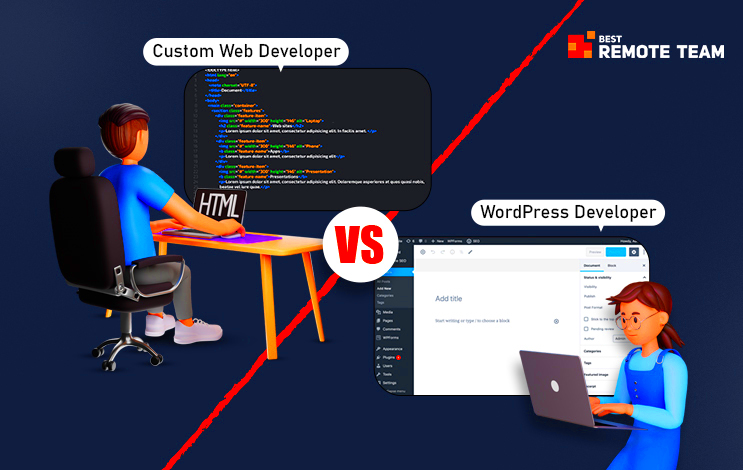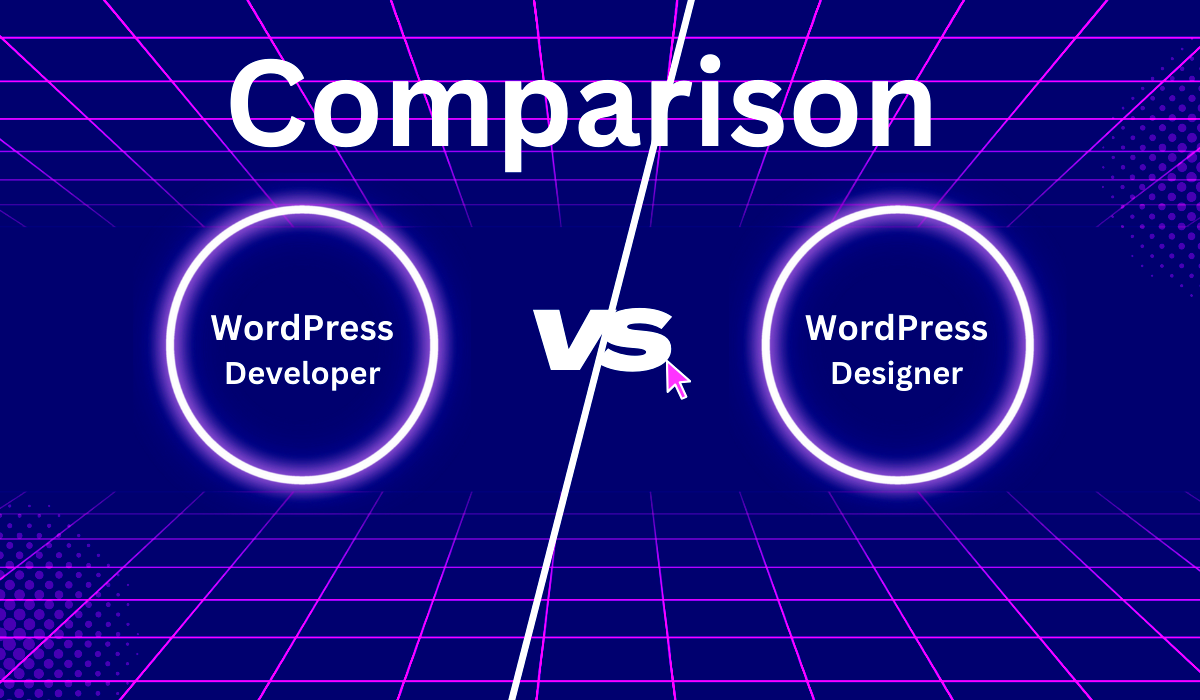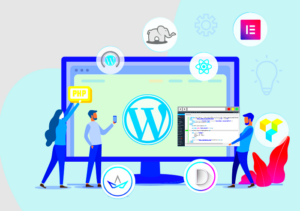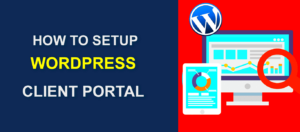When it comes to creating a WordPress website, you may often hear the terms “custom WordPress designer” and “developer” thrown around. But what do these titles really mean, and which one do you need for your project? Whether you’re launching a personal blog, an online store, or a corporate site, understanding the distinction between a designer and a developer can save you time, money, and a lot of potential frustration. Let’s break down what each role entails to help you make an informed choice!
Understanding the Roles

To make the right decision, it’s essential to understand the different skills and responsibilities that come with being a custom WordPress designer versus a developer. Let’s dive into what makes each role unique.
Custom WordPress Designer
A custom WordPress designer focuses primarily on the aesthetic and user experience aspects of a website. They bring your vision to life through layouts, colors, and site navigation. Here are some key responsibilities:
- Visual Design: Creating visually appealing designs that reflect your brand.
- Responsive Layouts: Ensuring your site looks great on all devices, from desktops to smartphones.
- User Experience (UX): Designing an intuitive layout that makes it easy for visitors to navigate your site.
- Graphic Assets: Developing or selecting images, fonts, and graphics that enhance the overall design.
Custom WordPress Developer
A custom WordPress developer, on the other hand, is more focused on the technical side. They ensure your site functions smoothly and effectively through coding and programming. Here are their main responsibilities:
- Code Development: Writing custom code to implement the features you need.
- Plugin Integration: Installing and configuring plugins that add functionality to your site.
- Website Performance: Optimizing site speed and ensuring it performs well under various conditions.
- Maintenance: Handling ongoing updates and troubleshooting any technical issues.
In summary, while the designer focuses on how your site looks, the developer ensures it works seamlessly. Depending on your needs, you might require one or the other—or even both!
What is a WordPress Designer?
When you think about a WordPress designer, envision the creative powerhouse behind the visual elements of a website. A WordPress designer is not just an artist but an expert in crafting an engaging, user-friendly experience on the WordPress platform.
Primarily, a WordPress designer focuses on the aesthetics and usability of a website. They are skilled in:
- Graphic Design: They use tools like Adobe Photoshop, Illustrator, and other design software to create stunning graphics and layouts.
- User Experience (UX) Design: Understanding how users interact with web elements, they ensure navigating through the site is seamless and enjoyable.
- User Interface (UI) Design: They create visually appealing interfaces that guide visitors to where you want them to go.
- Responsive Design: A WordPress designer ensures that the website looks great on all devices, including desktops, tablets, and mobiles.
A good designer will also have a basic understanding of HTML and CSS, allowing them to communicate effectively with developers. Many designers also specialize in specific themes or page builders like Elementor or Divi, making them experts at customizing pre-existing templates to match your brand identity.
If you want your website to stand out in terms of looks and functionality, hiring a WordPress designer might be the best path for you. They’re the ones who will give your online presence a unique flair, ensuring that every design element aligns with your brand’s vision.
What is a WordPress Developer?
On the flip side, we have the WordPress developer, the technical wizard who brings your website to life. While designers focus on the visual side, developers are all about functionality and coding. They ensure that everything works as intended behind the scenes.
A WordPress developer is skilled in various areas, including:
- PHP and MySQL: These are the core technologies behind WordPress. Developers utilize these languages to create custom features and functionalities.
- Plugins: They can build custom plugins or extend the functionalities of existing ones to meet specific needs.
- Theme Development: A developer can create a completely custom theme that aligns perfectly with your brand’s requirements.
- Debugging: They troubleshoot issues that arise, ensuring that your site runs smoothly without glitches.
Moreover, developers have a deep understanding of the WordPress core, APIs, and the latest coding standards. This allows them to integrate various third-party applications seamlessly, improving the overall performance of your site.
So, if you’re looking to add unique functionalities or custom features to your WordPress site, a developer is your go-to option. They are essential if you want to take your site beyond the standard templates and functionalities.
Key Differences Between Designers and Developers
When it comes to building a website on WordPress, understanding the distinction between a designer and a developer is crucial. Each role plays a unique part in the overall process of creating a visually appealing and functional website. Let’s delve into the key differences between these two professions.
| Aspect | Designer | Developer |
|---|---|---|
| Focus | Visual aesthetics, user experience, and branding. | Functionality, performance, and coding. |
| Skills | Graphic design, UX/UI principles, and color theory. | Programming languages (like PHP, JavaScript), database management, and server configuration. |
| Tools | Design software (like Adobe Photoshop, Sketch, Figma). | Development tools (like IDEs, code editors, and version control systems). |
| Output | Website layout, graphics, and branding elements. | Code that brings the designer’s vision to life, backend functionality. |
| Collaboration | Often works with marketing and branding teams for cohesive visuals. | Collaborates with designers to ensure practical implementation of designs. |
In summary, while a designer focuses primarily on the look and feel of the website, the developer brings that vision to reality through coding and technical execution. Understanding these key differences can help you determine which professional to hire based on your specific project needs.
When to Hire a WordPress Designer
Hiring a WordPress designer can significantly enhance the quality and appeal of your website. But how do you know when it’s time to bring one into your project? Here are some scenarios where you should definitely consider hiring a designer:
- Branding Needs: If you’re starting a new business or looking to rebrand, a designer can create a cohesive visual identity that aligns with your brand’s message.
- User Experience Focus: A designer knows how to optimize the layout and flow to ensure visitors can easily navigate through your site, enhancing overall user experience.
- Custom Design Elements: If your website demands unique graphics, icons, or other design elements that set you apart from the competition, a designer is essential.
- High-Quality Visuals: When your site needs high-resolution images, videos, or other media that require careful design consideration, hiring a professional ensures the best quality.
- Responsive Design: If you want your website to look good on all devices, a designer can guarantee that the design is responsive, maintaining aesthetics and functionality across platforms.
Overall, if your project involves anything that goes beyond standard WordPress themes and needs custom visual elements, hiring a WordPress designer will not only save you time but also elevate your website’s appeal and effectiveness. Don’t hesitate to seek a professional’s help when it’s necessary to achieve your vision!
7. When to Hire a WordPress Developer
Deciding when to hire a WordPress developer can be crucial for your website’s success. While many tasks can be handled by a custom WordPress designer, some situations specifically call for a developer’s expertise. Here are some key moments when a developer might be the best choice:
- Custom Functionality: If you need features that go beyond standard plugins or themes, a developer can create custom solutions tailored to your needs.
- Performance Optimization: When your website is slow or has heavy load times, a developer can enhance speed and efficiency through better coding practices.
- Complex Integrations: If you require third-party services or APIs to work seamlessly with your WordPress site, a developer has the technical skills to make that happen.
- Site Security: For advanced security measures, including custom firewall settings and data protection protocols, a developer can implement sophisticated solutions.
- Bug Fixes and Troubleshooting: If you’re encountering persistent issues that you can’t resolve, a developer’s problem-solving skills can save you time and frustration.
In essence, if your project is more about functionality than design, or if there’s a technical challenge that needs careful attention, it’s time to bring in a WordPress developer. They can help transform your ideas into a fully operational website while ensuring optimal performance and security.
8. Factors to Consider When Choosing Between the Two
When faced with the decision to hire either a custom WordPress designer or a developer, it’s crucial to assess several factors to ensure that you make the right choice. Here’s what to keep in mind:
| Factor | WordPress Designer | WordPress Developer |
|---|---|---|
| Primary Skills | Visual design, User interface (UI), and user experience (UX) | Programming, Coding, and technical problem-solving |
| Focus Area | Aesthetics and overall site layout | Functionality and site performance |
| Project Scope | Branding, themes, and graphics | Custom features, integrations, and bug fixes |
| Budget Considerations | Typically lower-cost for design-only projects | May involve higher costs for complex programming tasks |
| Your Goals | If branding and aesthetics are priorities | If functionality and customization are key |
Ultimately, the choice between a designer and a developer rests on your specific needs and goals. If you seek an eye-catching layout, a designer is essential. Conversely, if you’re aiming for advanced functionality, a developer should be your go-to. Assess your project’s requirements and align them with the right expertise to achieve the best results.
Conclusion: Making the Right Choice for Your Project
Choosing between a custom WordPress designer and a developer can be a pivotal decision in the success of your website project. Understanding the key differences between the two roles and their respective skill sets is crucial for aligning with your specific needs.
Custom WordPress Designers are primarily focused on the visual appeal and user experience of your website. They excel in tasks such as:
- Creating custom themes that align with brand identity
- Designing intuitive user interfaces
- Enhancing website aesthetics through graphics and layout choices
- Ensuring mobile responsiveness for greater accessibility
On the other hand, Custom WordPress Developers have a technical focus and are responsible for the functionality and performance of the site. Their services include:
- Custom plugin development
- Database management and server-side infrastructure
- Ensuring website security and performance optimization
- Implementing advanced functionality such as eCommerce or membership portals
When deciding who to hire, consider the following factors:
| Factor | Designer | Developer |
|---|---|---|
| Focus Area | Visual Design | Technical Functionality |
| Skills | Graphics, UI/UX | Programming, Database Management |
| Ideal For | Branding, Aesthetics | Custom features, Performance |
To make an informed decision, evaluate your project requirements, budget, and timeline. Ultimately, the right combination of design and development expertise can lead to a successful WordPress website tailored to your vision.



